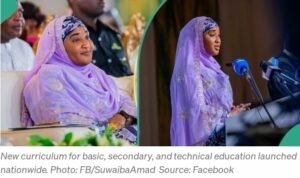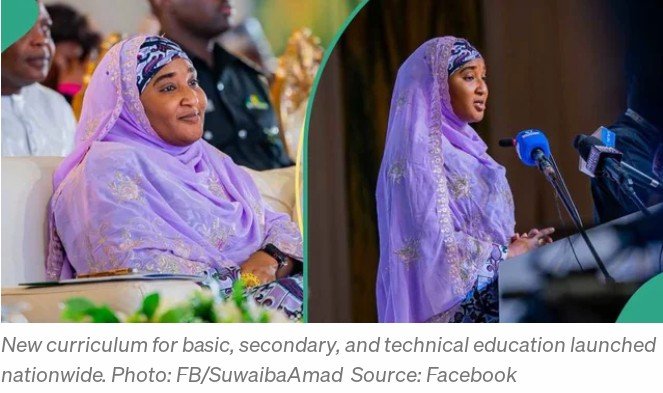– New Curriculum to reduce subject overload and encourage deeper learning

The Federal Government has rolled out a new curriculum for basic, senior secondary, and technical schools to reduce subject overload and encourage deeper learning
Under the revised structure, pupils and students will take fewer subjects with richer content tailored to their levels Primary school children will handle between 9 and 12 subjects, while senior secondary students will take 8 to 9, and technical students 9 to 11 D

The reform, announced by the Ministry of Education, seeks to ease content overload, reduce the number of subjects taken at each stage, and create more space for practical and deeper learning. New curriculum for basic, secondary, and technical education launched nationwide.
.
Minister of State for Education, Prof. Suwaiba Ahmad, explained that the review was developed in collaboration with key stakeholders, including the Nigerian Educational Research and Development Council (NERDC), Universal Basic Education Commission (UBEC), National Senior Secondary Education Commission (NSSEC), and the National Board for Technical Education (NBTE).
FG unveils new curriculum for primary and secondary schools in Nigeria, lists changes According to her, the goal is to balance quality and workload while ensuring schools nationwide adopt the framework under strict monitoring.
Below are key five changes to note: 1. Primary 1–3 Pupils at this stage will now take between 9 and 10 subjects. The core subjects are English Language, Mathematics, Basic Science and Technology, Culture and Creative Arts, Religion and National Values, and one Nigerian language. 2. Primary 4–6 Pupils will be required to take 10 to 12 subjects. Core areas are English Language, Mathematics, Basic Science and Technology, Culture and Creative Arts, Religion and National Values,
Pre-Vocational Studies, and a Nigerian language. WAEC poor results push FG to overhaul school curriculum for better education standards.
Junior Secondary School Students will now take 12 to 14 subjects. Core subjects include English Language, Mathematics, Basic Science and Technology, Culture and Creative Arts, Religion and National Values, Pre-Vocational Studies, Business Studies, French, and a Nigerian language.
4. Senior Secondary School – Students at this level will take between 8 and 9 subjects. The core list includes English Language, Mathematics, Civic Education, Humanities, Trade/Entrepreneurship Studies, Science and Mathematics, Technology, and Business Studies. 5. Technical Schools Technical students are expected to take 9 to 11 subjects under the new structure.
The ministry said the curriculum overhaul followed years of calls for reform. The last review for secondary schools was in 2011, while basic education was last updated in 2014.
More recently, in 2024, new occupational trades were added to promote practical skills such as digital literacy, robotics, plumbing, solar installation, and garment-making. Prof. Ahmad noted that although students will take fewer subjects, the content has been improved for stronger knowledge acquisition. “Although pupils and students go now take lesser subjects, however, di koko na say dem don improve di content to allow for deeper learning,” she stated.




